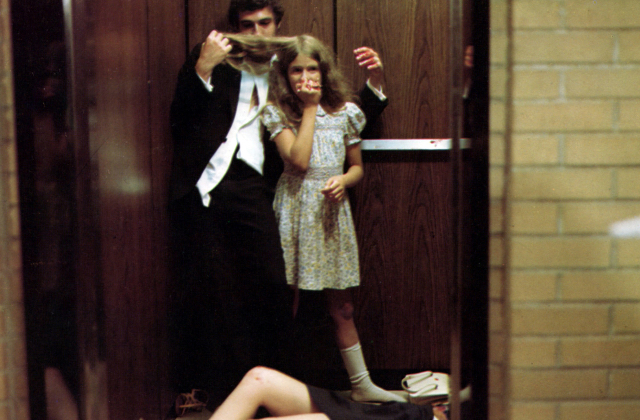Thank you all who attended the Miskatonic New York lecture “Concrete Maternality: On Late Capitalism and High Rise Horror” with Émilie von Garan. Please find below a list of reading materials for your further edification.
- Agrest, Diana, Patricia Conway, and Leslie Weisman. The Sex of Architecture. New York: Harry N. Abrams. 1996.
- Bakhtin, Mikhail. Rabelais and His World. Translated by Helene Iswolsky. Bloomington: Indiana University Press, 1984.
- Bataille, Georges. Erotism: Death & Sensuality. San Francisco: City Lights Books, 1962.
- Bogira, Steve. “They Came in Through the Bathroom Mirror: A Murder in the Projects.” Chicago Reader. September 3 1987.
- Bogira, Steve. “How a Story About the Horrors of Housing Projects Became Part of a Horror Movie.” Chicago Reader. March 14 2014.
- Borden, Iain, Jane Rendell, and Barbara Penner. Gender Space Architecture: An Interdisciplinary Introduction. London: Routledge, 2002.
- Briefel, Aviva, and Sianne Ngai. “‘How Much Did You Pay for This Place?’ Fear, Entitlement, and Urban Space in Bernard Rose’s Candyman.” Camera Obscura 13.1, (1996): 69-91.
- Clover, Carol J. Men, Women, and Chain Saws: Gender in the Modern Horror Film. Princeton, New Jersey: Princeton University Press, 1992.
- Creed, Barbara. The Monstrous-Feminine: Film, Feminism, Psychoanalysis. London: Routledge, 1993.
- Donaldson, Lucy Fife. “‘The Suffering Black Male Body and the Threatened White Female Body’: Ambiguous Bodies in Candyman.” The Irish Journal of Gothic and Horror Studies 9 (2011): 32.
- Dreier, Peter. “Reagan’s Legacy: Homelessness in America.” National Housing Institute. Shelterforce Online, 135. (2004).
- Fisher, Mark. Capitalist Realism: Is There No Alternative? London: Zero Books, 2009.
- Grant, Barry Keith, Ed. The dread of difference: gender and the horror film. Austin: University of Texas Press, 2015.
- Hackworth, Jason. “Progressive Activism in a Neoliberal Context: The case of Efforts to Retain Public Housing in the United States.” Studies in Political Economy 75.1 (2005): 29-51.
- Hackworth, Jason. The Neoliberal City: Governance, Ideology, and Development in American Urbanism. Ithaca: Cornell University Press, 2007.
- Harvey, David. A Brief Introduction to Neoliberalism. Oxford: Oxford University Press, 2006.
- Hester-Williams, Kim D. “NeoSlaves: Slavery, Freedom, and African American Apotheosis in Candyman, The Matrix, and The Green Mile.” Genders 40 (2004): 3-43.
- Hoeveler, Diane Long. “The Postfeminist Filmic Female Gothic Detective: Reading then Bodily Text in Candyman.” Postfeminist Gothic (2007): 99.
- Holland, Sharon Patricia, and Donald E. Pease. Raising the Dead: Readings of Death and (Black) Subjectivity. Duke University Press, 2000.
- Jameson, Fredric. Postmodernism, or, the cultural logic of late capitalism. Durham: Duke University Press, 1991.
- Jencks, Charles. The Language of Post-Modern Architecture. London: Academy Editions, 1977.
- Kristeva, Julia. Powers of Horror. Translated by Leon S. Roudiez. New York: Columbia University Press, 1982.
- Kuhn, Andrea. ““What’s the Matter, Trevor? Scared of Something?” Representing the Monstrous-Feminine in Candyman’.” Erfurt Electronic Studies in English (2000).
- Lico, Gerard Rey. “Architecture and Sexuality: The Politics of Gendered Space.” Humanities Diliman: A Philippine Journal of Humanities 2.1 (2001)
- Robin R Means Coleman. Horror Noire: Blacks in American Horror Films from the 1890s to Present. Taylor and Francis, 2013.
- Sanjek, David. “Dr. Hobbes’s Parasites: Victims, Victimization, and Gender in David Cronenberg’s” Shivers”.” Cinema Journal (1996): 55-74.
- Soare, Monica. “The Return of the Female Gothic: The Career-Woman-In-Peril-Thriller.” In Situating the Feminist Gaze and Spectatorship in Postwar Cinema. Ed. Marcelline Block. Cambridge Scholars Publishing (2009): 88-98.
- Stallybrass, Peter, and Allon White. The Politics and Poetics of Transgression. Ithaca: Cornell University Press, 1986.
- Sharpe, Christina Elizabeth. In the Wake: on Blackness and Being. Duke University Press, 2016
- Stephens, Laura Anne. “An Exploration of Sexual Transgression and Psychological Transformation in David Cronenberg’s Shivers (1975).” Film Matters 3.1 (2012): 20-24.
- Ussher, Jane M. Managing the Monstrous Feminine: Regulating the Reproductive Body. New York: Psychology Press, 2006.
- Zizek, Slavoj. Enjoy Your Symptom!: Jacques Lacan in Hollywood and Out. London: Routledge, 2013.

